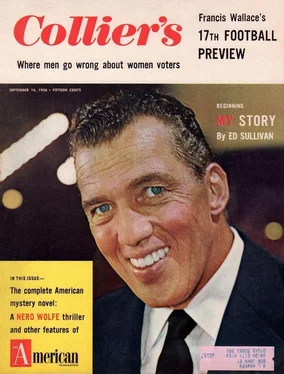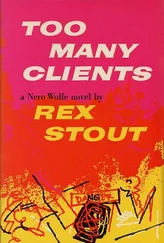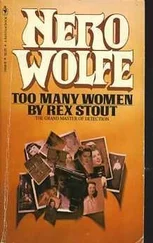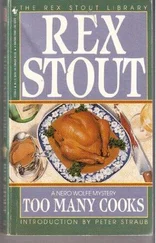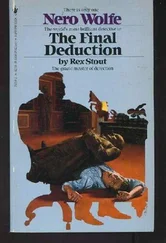Rex Stout - Too Many Detectives
Здесь есть возможность читать онлайн «Rex Stout - Too Many Detectives» весь текст электронной книги совершенно бесплатно (целиком полную версию без сокращений). В некоторых случаях можно слушать аудио, скачать через торрент в формате fb2 и присутствует краткое содержание. Год выпуска: 1956, Издательство: The American Magazine, September 1956, Жанр: Классический детектив, на английском языке. Описание произведения, (предисловие) а так же отзывы посетителей доступны на портале библиотеки ЛибКат.
- Название:Too Many Detectives
- Автор:
- Издательство:The American Magazine, September 1956
- Жанр:
- Год:1956
- ISBN:нет данных
- Рейтинг книги:3 / 5. Голосов: 1
-
Избранное:Добавить в избранное
- Отзывы:
-
Ваша оценка:
- 60
- 1
- 2
- 3
- 4
- 5
Too Many Detectives: краткое содержание, описание и аннотация
Предлагаем к чтению аннотацию, описание, краткое содержание или предисловие (зависит от того, что написал сам автор книги «Too Many Detectives»). Если вы не нашли необходимую информацию о книге — напишите в комментариях, мы постараемся отыскать её.
in the murder of a deceptive client.
Too Many Detectives — читать онлайн бесплатно полную книгу (весь текст) целиком
Ниже представлен текст книги, разбитый по страницам. Система сохранения места последней прочитанной страницы, позволяет с удобством читать онлайн бесплатно книгу «Too Many Detectives», без необходимости каждый раз заново искать на чём Вы остановились. Поставьте закладку, и сможете в любой момент перейти на страницу, на которой закончили чтение.
Интервал:
Закладка:
“But why were we all there?” Wolfe demanded. “That Miss Bonner and Mr. Ide and I had been brought together purposely was understandable, but not Mr. Kerr and Mr. Amsel. There was no connection, on the record; and yet they were connected, most significantly, since they too had had dealings with Donahue. By coincidence only? I didn’t believe it. One of them, possibly, but surely not both. So my attention was diverted to the question, who had arranged for us all to be summoned to appear the same day? And simultaneously to another question, was there anything in common among the five men whose wires Donahue had wanted to tap? That suggested still another, why had he gone to five different detectives to arrange for the taps? Might it not have been because the five men did have something in common, and he didn’t want that fact to be noted?”
Wolfe moved his eyes to Hyatt as if inviting an answer, but didn’t get one. He returned to Groom. “My first question had to wait, since I couldn’t very well call Mr. Hyatt and put it to him. The second was soon answered. I learned that four of the men whose wires had been tapped were members of the Charity Funds Investigating Committee, and had reason to suppose that the fifth one was also, embracing the entire committee. With that, I decided to describe the situation as I saw it to these ladies and gentlemen, and to enlist their co-operation. If it turned out that my surmise was wrong and one of them was in fact guilty, no harm would have been done; on the contrary, their reactions to my proposal might be indicative. I learned—”
“What proposal?” Groom demanded.
“I’m telling you. I learned that among them they had forty or more operatives in New York, and I could supply four or five. After describing the situation to them, I proposed that we put as many men as possible — and women — to work immediately. There were three main lines: one, the Hotel Marbury, where Donahue had lived; two, the background and interests and activities of Albert Hyatt, with emphasis on any discoverable connection with the Charity Funds Investigating Committee; and three—”
“You mean you suspected Hyatt of murder?”
“I mean I had formed a surmise I thought worth testing, and my confreres agreed with me. I have already put the question, who had arranged for all seven of us to appear on the same day? Mr. Hyatt was conducting the hearing. Another point, which is usually thought significant, but which you seem to have ignored, was that Mr. Hyatt was the last person, as far as was known, to see Donahue alive. Still another was that Hyatt had said that Donahue had told him that I had been given the name Donahue and that I had known the tap was illegal. I knew that either Donahue had lied or Hyatt was lying, and Donahue was dead.”
Wolfe lifted his shoulders and dropped them. “What I suspected at that point is no longer important. The third line of investigation was to find evidence of former association between Hyatt and Donahue. My confreres made phone calls, and I made one myself. By ten o’clock this morning we had — how many operatives Miss Bonner?”
“By ten o’clock, thirty-four. By two this afternoon, forty-eight. Forty-two men and six women.”
Steve Amsel suddenly exploded. “Too many detectives, Hyatt! Cancel our licenses! Too many!”
“Shut your trap!” Jay Kerr ordered him. “Wolfe’s telling it.”
Wolfe ignored them. “Reports started to reach us before one o’clock and have been arriving all afternoon, up to an hour ago, when we told the people in New York that we had enough for our purpose. Miss Bonner and Miss Colt took most of them, but the others helped. There was no important result from the first line of investigation, the Hotel Marbury. From the second, Hyatt’s background and interests and activities, there was nothing conclusive, but much that is pregnant. Eighteen months ago derogatory information about the activities of fund-raising organizations began to appear in the press, and as the weeks passed it increased in volume and significance. A little more than a year ago Mr. Hyatt was retained as consulting counsel by a large fund-raising organization which had realized large profits, variously estimated at from one to three million dollars annually, from its operation. That was about the time that the governor set up the Charity Funds Investigating Committee, and Mr. Hyatt’s client might reasonably expect to be a major target of that committee. There is some evidence that Mr. Hyatt approached two members of the committee in an effort to learn its plans—”
“What do you mean, ‘some evidence’?” Groom demanded.
Wolfe tapped the papers on the table. “It’s here waiting for you, but as I said, it is not conclusive. The committee members were not loquacious with our private operatives, but no doubt they will be more helpful with officers of the law. I merely give you this from our second line of investigation: that Mr. Hyatt was keenly interested in that committee and its plans. The results from our third line were more than pregnant, they were decisive, or close to it. It was of course the most promising, and thirty of the operatives were assigned to it. They were provided with pictures of Hyatt and Donahue from newspapers, and they found three people who had seen them together on two different occasions last spring — under circumstances that may fairly be described as furtive. I will not oblige Mr. Hyatt by naming the people and occasions and places, but that information is here.” He tapped the papers again.
“And Mr. Hyatt has stated, in my hearing and yours, that he had never seen Donahue before yesterday morning. You asked if I suspect him of murder. I do now, yes. There are of course questions I am not prepared to answer, except with conjectures if you want them — for instance, the most important one, why did he arrange for all of us — he knew, of course, with whom Donahue had arranged for the taps — to appear before him on the same day? As a conjecture, because that was his best alternative, since we all had to be summoned for inquiry sooner or later, either in New York or in Albany, and he wanted us himself, not his colleague in New York. Having us all on the same day insured that we would all be at hand, to be called back in if occasion demanded it; and if things went smoothly he might well have intended to have us together before him and tell us magnanimously that, since our separate statements corroborated the assumption that we had all been imposed upon by a scoundrel, he would recommend no action against us.”
Wolfe turned a hand over. “For he supposed, of course, that Donahue was safely out of the way, out of the state and not to be found. Unquestionably he had so arranged it. The situation held no great hazard for him. The fact that one of his clients was one of the targets of investigation of one of the governor’s committees had no known connection with the investigation he was himself conducting, and he was confident that no such connection would be discovered or even suspected. Possibly he was even cocky, for he may have got, from the tapped wires, the information about the committee’s plans and intentions that he needed. If so, he got a shattering blow when he answered his phone yesterday morning and was told that a man named Donahue wanted to see him about something urgent and confidential.”
Wolfe’s eyes went to Hyatt and back to Groom. “If you want another conjecture, what passed between Hyatt and Donahue in room thirty-eight yesterday, the most obvious one is that Donahue threatened to divulge the whole story — either as a screw for extortion, or because Donahue had learned that we seven had been called to appear together and suspected that he was to be made a scapegoat — and the obvious is often the best. Those questions, and others, are your concern, Mr. Groom, not ours. Our only concern was to show you that you were much too ready with a false assumption. As for Mr. Goodwin and me, I suppose you could successfully defend an action for false arrest, but I trust you have learned that it is infantile to take the word of a man as gospel merely because he is a special deputy of the secretary of state. Can the charge against us be dismissed tonight?”
Читать дальшеИнтервал:
Закладка:
Похожие книги на «Too Many Detectives»
Представляем Вашему вниманию похожие книги на «Too Many Detectives» списком для выбора. Мы отобрали схожую по названию и смыслу литературу в надежде предоставить читателям больше вариантов отыскать новые, интересные, ещё непрочитанные произведения.
Обсуждение, отзывы о книге «Too Many Detectives» и просто собственные мнения читателей. Оставьте ваши комментарии, напишите, что Вы думаете о произведении, его смысле или главных героях. Укажите что конкретно понравилось, а что нет, и почему Вы так считаете.
